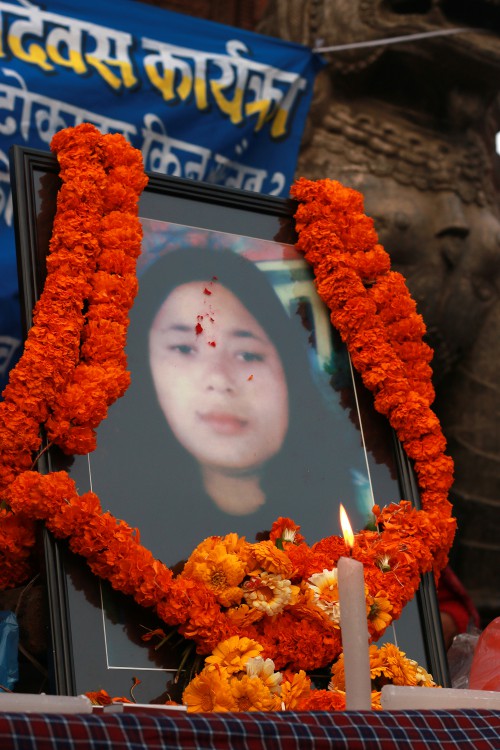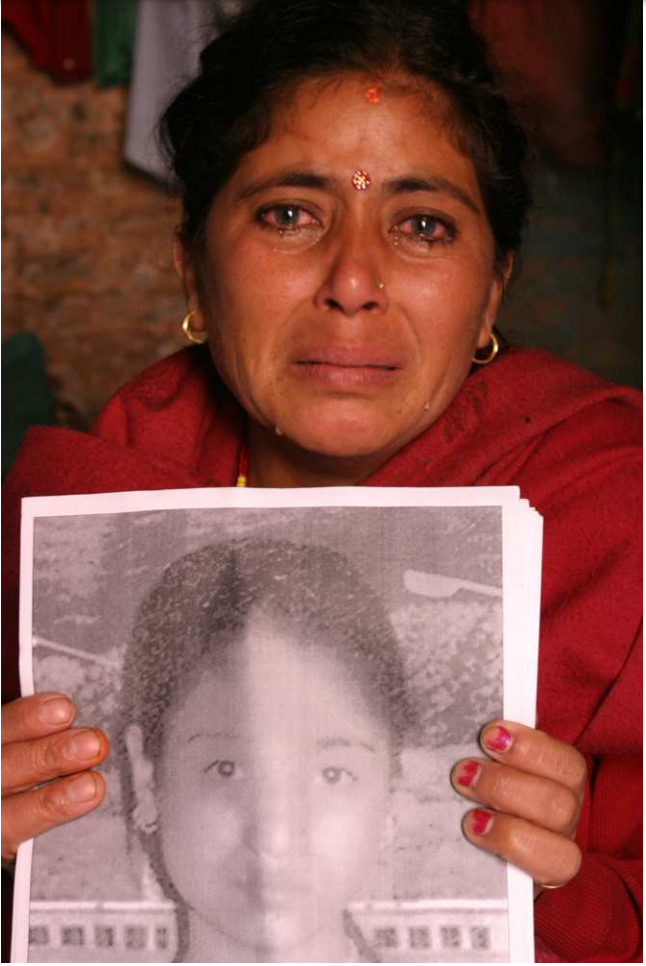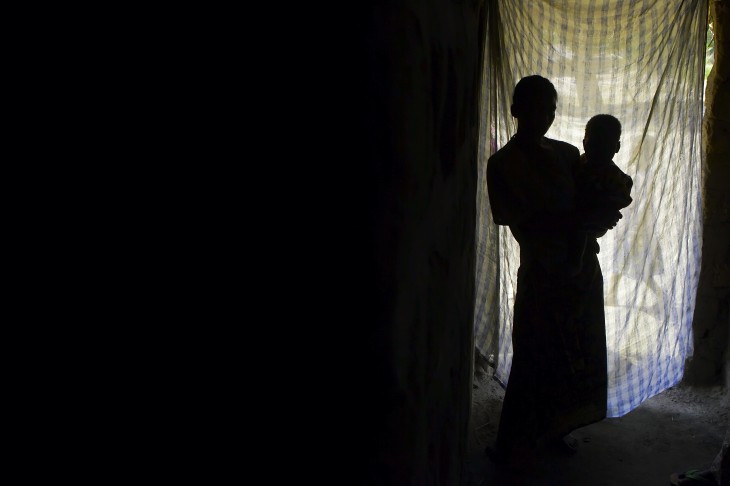
Longreads
Features
14 MIN READ

Fifteen years since the 10-year conflict ended, there is no justice and little peace for victims of rape and sexual violence.

On midnight, February 12, 2004, five armed soldiers from the then Royal Nepal Army barged into a house in Kavre. They accused 17-year-old Reena Rasaili of being a Maoist and dragged her out of her home. Reena was tortured and gang-raped for five hours. In the morning, her naked and bruised body was found tied to a tree. She had been shot three times in the head, eye, and chest.
It has been 17 years since that brutal war crime and 15 years since the Maoist conflict came to an end with the signing of the Comprehensive Peace Agreement (CPA) in 2006. And yet, there has been no justice and little peace for Reena’s family. A First Information Report (FIR) was lodged by Reena’s family on May 25, 2006 but an investigation was not carried out by the police. It was only after the Supreme Court ordered the Kavre District Police Office in 2009 to proceed with the investigation that one junior officer, Kaji Bahadur Karki, was arrested in 2010. But even Karki was eventually acquitted of all charges citing a lack of evidence and released in 2013.

“Appeals were made after the decision of the Kavre District Court to acquit Karki,” said Gita Rasaili, Reena’s sister. “But Karki was let go.”
Nepal’s 10-year armed conflict came to a formal end with the signing of the CPA and the promulgation of the Interim Constitution of Nepal in 2007. But for victims of the conflict, especially those who suffered from sexual violence, there has been no real end to their pain and suffering. Despite being victims of serious human rights abuses by both sides during the conflict, their cases have been largely ignored or have stalled for years in the courts.
Section 5.2.5 of the CPA provided for the establishment of a transitional justice system that would ensure truth, justice, and reconciliation in the aftermath of the civil conflict through a high-level Truth and Reconciliation Commission. But it took over 10 years since the signing of the CPA for the commission to even be established.
In 2014, the Enforced Disappearance Enquiry, Truth and Reconciliation Commission Act, informally referred to as the transitional justice act, was finally promulgated. Subsequently, a year later, the Truth and Reconciliation Commission (TRC) and the Commission of Inquiry on Enforced Disappearance (CIEDP) were established to look into gross violations of human rights during the conflict years and recommend reparations and/or legal action.
Section 2 (j) (6) of the transitional justice act categorizes rape and sexual violence, in addition to murder, abduction, enforced disappearance, and torture, as “gross violations of human rights”. Section 26(2) states that no amnesty can be recommended in cases of rape or offenses of a “grave nature”. An initial caveat in this section, stating that amnesty cannot be given only “where sufficient ground and reason are not found to grant amnesty from the investigation of the Commission”, was struck down by the Supreme Court in 2014 as incompatible with international standards for transitional justice.
Rights advocates and conflict victims had long demanded that there can be no amnesty for perpetrators of serious violations of human rights and the Supreme Court’s decision acknowledged that demand. Alongside other serious violations, the highest court in the country recognized rape and sexual violence as grave, heinous crimes that cannot be forgiven with amnesty. Thus, all cases of sexual violence registered at the TRC demand legal prosecution.
“Out of the nearly 64,000 cases lodged at the TRC, 310 cases are regarding sexual violence,” said Rukamanee Maharjan, a lecturer at the Nepal Law Campus. “However, we cannot conclude this to be reflective of the reality of sexual violence inflicted during the conflict because, without the assurance of confidentiality and the culture of victim-blaming, many victims have not publicly come out with their complaints because of the fear of revictimization.”
Out of the cases that have been lodged too, almost none of the cases have proceeded towards a hearing or trial, let alone prosecution. Many of the complaints are lodged against people who are now at the forefront of Nepali politics and even lead government institutions. For instance, Agni Sapkota, the current Speaker of the House of Representatives, is accused of kidnapping and murder in the conflict-era killing of Arjun Lama.
In recognition of the continuing culture of impunity, the Supreme Court had ordered the Nepal government in 2015 to amend the transitional justice act but the order was never implemented. The two transitional justice commissions have instead been highly politicized and many conflict victims have refused to work with them. The tenure of the two commissions has been extended multiple times but they have little to nothing to show.
Furthermore, the transitional justice system is not in line with international mandates. Nepal has ratified the Convention on the Elimination Against of All Forms of Discrimination Against Women (CEDAW), which mandates that the state end discrimination and violence against women.
According to the Civil Society Report on Beijing+25 Report, Nepal drafted a National Action Plan (NAP) in 2011 based on the UN Security Council’s Recommendations 1325 and 1820. UNSCR 1325 mandates that parties to any conflict ensure that women and girls are protected against sexual violence. More importantly, UNSCR 1820 recognizes sexual violence against women during the conflict as a crime against humanity and a war crime.
Phase-I of NAP, which was conducted from 2011-2016, addressed conflict-related sexual violence at a policy level. NAP-I carried out various programs such as sensitizing army and security personnel on human rights and rights of women and girls, local level-empowerment, and rehabilitation of survivors and female combatants from both sides, increasing literacy on transitional justice and conflict through school curriculums and implementing an overall gender-sensitive approach in policies.
Phase-II has yet to be implemented.
***
Sexual violence against women and girls was rampant during the Maoist conflict. According to OHCHR’s 2012 Nepal Conflict Report, both parties weaponized rape and sexual violence as a form of torture, punishment, and intimidation, but sexual violence was more commonly perpetrated by the state forces. In 2014, Human Rights Watch detailed dozens of instances of sexual violence and rape by both the Maoists and the state security forces in a landmark report, ‘Silenced and forgotten: Survivors of Nepal’s conflict-era sexual violence’.
This is often the case with most conflicts around the world where sexual violence is alarmingly common. But such forms of violence are often downplayed because they are seen as ‘inevitable’ during war. However, conflict-related sexual violence is distinct from other forms of sexual violence because the former is often employed as a tool of war. Women are punished because of their perceived loyalties towards one party or the other. Rape is an extreme violation of a woman’s integrity and bodily autonomy but it is also used to punish their families and loved ones. The bodies of women are thus reduced to a medium, much like weapons of war.
“Sexual violence is downplayed as an inevitable event that was bound to occur during the conflict,” said Gita Rasaili. “Raping women was an act of victory.”
The Nepal Conflict Report describes the various types of sexual violence inflicted on women during the conflict: sexual harassment, verbal abuse by using derogatory slurs, gang rape, rape, attempted rape, forced public nudity, gender-based violence, and sexualized forms of torture. In one especially heinous incident, one victim reported the Nepal Army using dogs to rape them.
Despite such widespread and horrific forms of sexual violence, there are numerous obstacles preventing victims and their families from accessing justice.
One such barrier is the current statutory limit of one year to register rape cases, as per the 2017 Criminal Code. Even this one-year limitation was a result of relentless advocacy as earlier, it was a mere 35 days, followed by six months. The courts cannot initiate any legal proceedings on conflict-era rape cases as they occurred over a decade ago. The transitional justice act thus needs to take this into account and allow the registration of rape cases from the conflict years.
Another legal barrier is the burden of evidence. In cases of rape, the victim’s statements are often the most accessible pieces of evidence. Medical reports and corroborating testimonies can help provide supporting evidence but they need to be conducted in the immediate aftermath. Victims of rape and sexual violence cannot produce such physical evidence now and even testimonies can be deemed to be unreliable as too much time has passed.
“For rape cases, the testimony of the victims is very important. Courts should allow victim statements to qualify as evidence when physical evidence cannot be gathered,” said Maharjan, the law professor. “Similarly, patterns of sexual violence can be evaluated and studied based on case studies and statistics from various reports to verify these testimonies. In cases of sexual violence during the conflict, the judiciary should forfeit a hard stance on physical evidence of the crime.”
Nepal’s deeply entrenched rape culture too creates more socio-cultural barriers to registering complaints. The environment for sexual violence survivors is such that revictimization often occurs due to the culture of victim-blaming. The general stigma of being a survivor of sexual violence deters them from coming out openly with their stories. As many years have passed since the conflict, many of the victims have moved on with their lives, married, and started their own families. Thus, the lack of privacy of sexual violence victims during the conflict era has proved to be a major barrier, even though the Truth and Reconciliation Commission Complaint Investigation Procedure 2016 mandates that confidentiality be assured. The Procedure further mandates that the police officer dealing with women and girls also be a woman. However, Local Peace Committees, grassroots committees responsible for registering, investigating, and verifying the complaints of conflict victims, failed to abide by such mandates, especially in rural areas. Such inadequacies reflect the lack of a gender-sensitive approach within the transitional justice system.
“Privacy of the survivors should be protected because stigmatization and victim-blaming form major cultural barriers. Without a guarantee of confidentiality, victims will naturally be reluctant to register complaints,” said advocate Laxmi Pokharel, a transitional justice expert from the International Commission of Jurists. “This goes hand-in-hand with the legal barriers of statutory limitation of a year and the barrier of immediate medical evidence.”
Another procedural barrier is the lack of consolidated and comprehensive data related to all victims of conflict, not just survivors of sexual violence. The state has failed to collect, record, and archive a comprehensive data set related to victims of the conflict. The CIEDP, TRC, local governments, and various civil society organizations have all collected data separately. This has resulted in two problems – a failure to properly recognize victims of sexual violence and the gravity of the various offenses committed and a lack of provisions for specific immediate relief for victims of sexual violence and increased barriers in the overall healing process.
The lack of segregated data also clubs all forms of sexual violence together, failing to account for the varying degrees of the crimes committed. Furthermore, while there is rudimentary data on sexual violence inflicted on women and girls, there are no statistics on victims who are men, young boys, people with disabilities, transgender individuals, and other LGBTQIA+ members. Conflicts all around the world, like in northern Uganda and Syria, are a testament to the fact that victims can be gender minorities and boys too. Further, while the sexual violence inflicted by the state party on Maoist forces and vice-versa has been recognized, sexual violence within the two sides have not been recorded either.
Without consolidated data, survivors also have difficulty accessing specific relief. Survivors of sexual violence are currently not beneficiaries of the Interim Relief Program (IRP), a governmental reparation scheme that also awards compensation as decided by the two Commissions, has promised approximately Rs 10 lakhs for each family. But as the eligibility criteria for beneficiaries is very narrow, survivors of sexual violence are unable to qualify as beneficiaries, according to a report by the Forum for Women, Law, and Development (FWLD).
According to Lily Thapa, a member of the National Human Rights Commission who was involved in the drafting process of NAP-I, despite much lobbying, both victims of sexual violence and of torture were not formally recognized as the ‘victims of the conflict’ and thus were not eligible for the relief program.
“I have seen survivors of sexual violence who were unable to afford a tablet of Cetamol,” said Devi Sunuwar, mother of Maina Sunuwar, a 15-year old tortured and killed by the state forces a few days after the murder of her cousin, Reena Rasaili. Devi’s vocal outcry about Reena’s murder led a group of soldiers to come to her home to arrest her. Unable to find Devi, they arrested her daughter Maina instead. Maina was tortured with electric shocks and suffocated by submerging her head in water till she died.

In 2005, three soldiers – Amit Pun, Sunil Adhikari, and Boby Khatri – were court-martialed and sentenced to a mere six months. However, in 2017, after Devi’s relentless advocacy, the case was reopened and the three were sentenced to 20 years. The highest-ranking officer, Niranjan Basnet, however, was acquitted of all charges.
Maina’s case was the first time that state troops had been prosecuted in a criminal court for conflict-era rights abuses. It remains one of the few. Devi remains skeptical as to whether the soldiers will even serve their full sentences.
***
Both Devi Sunuwar and Gita Rasaili, along with many other survivors of sexual violence, demand a targeted relief program. Survivors of sexual violence have distinct immediate and long-term needs, including medical support and treatment for long-term reproductive health issues like bleeding, uterus problems, sexually transmitted diseases, and miscarriages. They require free or subsidized reproductive health medication and services, abortion and contraception services, and the management of any physical trauma that has caused disability. Survivors often also need life-long psychosocial counseling for Post-Traumatic Stress Disorder (PTSD).
Livelihood support is another critical component of the relief program. The children of survivors need scholarships, quotas in universities and civil services, and educational support from the state. Similarly, husbands have deserted and divorced wives upon discovering that they were victims of conflict-related sexual violence. The state must ensure that such children receive citizenship and identity cards, are protected against domestic violence and are able to access medical support against sexually transmitted diseases acquired from birth.
“Without official data, the state can deny the occurrence of any sexual violence and therefore, doesn’t need to provide any specific interim relief programs,” said Gita Rasaili. “Victims of sexual violence have separate medical and psychological needs than that of other victims, so reparations should specifically cater to such needs.”
More importantly, state recognition is important for healing. Had the state recognized the atrocities inflicted on survivors of sexual violence with a public apology – or by simply parks and memorials to victims – would have had an easier time moving on. Yet, the state continues to deny any such violence because the victims have not been reduced to a mere number in the official database.
***

Over a decade-and-a-half has passed since the end of the armed conflict in Nepal, yet the wounds of survivors of sexual violence continue to fester. The judiciary must adopt a more flexible and empathetic approach while dealing with cases of sexual violence during the conflict. The statute of limitations for rape cases should be extended, if not removed completely.
Small administrative reforms, such as identity cards, can go a long way in assisting survivors of sexual violence. Identity cards are paramount in obtaining relief and reparation packages. Separate relief packages must be arranged for survivors of sexual violence because their physical and social needs are different. All in all, it is time that the state publicly recognizes and expresses regrets for sexual violence against women during the conflict.
More importantly, society itself must actively work to erase the deep-rooted rape culture. Survivors of sexual violence, not just conflict victims, cannot be revictimized by society. Victim-blaming and stigma against survivors must stop. Women should not have to think twice before registering a complaint of sexual violence out of fear of being blamed instead.
Lastly, the Supreme Court’s order to amend the transitional justice act must be implemented and the impartial and apolitical nature of the commissions ensured. The commissions themselves must work relentlessly to seek the truth and provide effective recommendations that place victims at the center.
As long as justice eludes the victims of rape and sexual violence, the conflict will not have truly ended.
***

Ameesha Rayamajhi Ameesha Rayamajhi is a law and social science student at NALSAR University of Law, India.


Features
8 min read
Every year, cases of violence against women online are increasing in Nepal, and they have been made worse by ambiguously worded laws and policies and a general lack of public awareness.
Film
Features
7 min read
At Film South Asia, four Nepali women filmmakers explore how the private and the personal relate to the public and the collective.
Features
5 min read
The politics of the deaths of individual bodies, social groups, or entire populations has become increasingly normalised
COVID19
3 min read
A daily summary of all Covid19 related developments that matter
Perspectives
4 min read
Access to citizenship must expand beyond conjugality
Perspectives
9 min read
The current protests will need to truly speak on behalf of Nepal’s poor, not just the middle class
COVID19
Features
3 min read
The government’s latest set of decisions has baffled experts and the public alike
Explainers
2 min read
A refresher on what laws are being discussed in the national legislature.